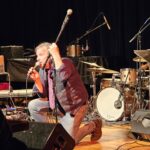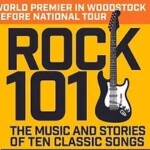Photos by Mary P. Hynes
Sunday began in rousing fashion as NYC’s “joyful jazz” ensemble, Sammy Miller & The Congregation—a barefoot clad sextet with three horns led by vocalist/drummer Miller—showed that jazz can be lots of fun. The soloists, including the city’s emerging saxophonist Ben Flock, trumpeter Alphonso Horne (both of whom are bandleaders) along with trombonist Sam Crittendon played explosive solos and danced around the stage as pianist David Linard and bassist/tuba player Corbin Jones added their own musical and humorous touches.
From there we made our first trip to Storyville, also known as the Museum stage. It’s a small, quaint venue where the Phil Madeira piano trio performed a bright set of the Rhode Island native’s tunes, most from 2017’s Providence, an album full of songs about the state such as “Rhode Island Yankee on Jefferson Davis Court” and “Crescent Park.” Madeira, who plays in Emmylou Harris’ band, The Red Dirt Boys, was joined by fellow bandmate, drummer Bryan Owings and recruited bassist from NYC, Jesse Murphy. On the nearby Harbor Stage Christian McBride introduced tenor saxophonist Marcus Strickland as unique because he uses his sax as a rhythm instrument. His quartet Twi-life does feature electronic keyboards prominently, often in an atmospheric way as Strickland carries both melodies and rhythms.
Performing on the Quad stage was another supergroup of sorts, a special project gathered by leader Walter Smith III (tenor sax). The ubiquitous Joel Ross on vibraphones showed again, joined by Canadian guitarist Matt Stevens, bassist Harish Raghavan, and drummer Kendrick Scott, most of whom, like Ross, are also bandleaders. Theirs was a set of progressive jazz with classical flourishes that had them reading “music not as complex as we might normally write,” according to Smith III. Yet, it was some of the more esoteric music heard over the three days.
The major highlight of the day, and one of the top three of the three days, was London-based Sons of Kemet. The quartet (two drummers, tuba player Theon Cross and saxophonist Shabaka Hutchings, both of whom are bandleaders on their own projects, are known for danceable, scintillating grooves and played at near-peak intensity for 40 minutes.The entire Quad crowd rose to their feet and remained through the entire set, which Hutchings remarkably closed by removing the mic from his sax and blowing a gentle melody to brushes from the drums. Prior to that surprising ending, Cross and Hutchings would often face each other, call-and-response, soaring, throbbing and churning. At times Cross made his tuba sound like an electric bass. It was a full-on dance party with all age groups participating.
Meanwhile veteran trumpeter/keyboardist Terence Blanchard played a dreamy set, melding the acoustic with the electronic while fans basked in the heat, some wandering down to the bay, hoping to catch a cooling breeze. Heat didn’t seem to bother New Orleans-based Tank and the Bangas led by singer/rapper Tarriona Ball’s funky eccentric vocals that blurred the lines between jazz, rap, and pop. Her bandmates were dressed resplendently as their leader, signaling that it was time to have some fun. Acclaimed and multi-award winning vocalist Cecile McLorin Salvant took the elegant route instead. She’s known for giving old songs, many of the bawdy variety, completely new interpretations. Here though she was in a more somber mood, dedicating her set to her recently deceased drummer Lawrence Leathers. Through classics like “Devil May Care,” “Nobody Else But Me” and even the Scottish folk song “Raggle Taggle Gypsies,” her nuanced delivery, unpredictable phrasing, precision, and superb range set her apart from every other vocalist.
The final act, as McBride indicated, “the only way we end this festival” was popular rapper/activist/actor Common who delivered positive messages to the mostly young crowd who surged to the front of the Fort Stage. Surely, we again missed some “buzz” acts on Sunday like Christina Sands’ Tthree-piano Erroll Garner Tribute, PJ Morton, Elew, and Matana Roberts, to name a few. Nonetheless it would be nearly impossible to surpass the musical and emotional breadth of what transpired over the three days in Newport.
—Jim Hynes























Be the first to comment!